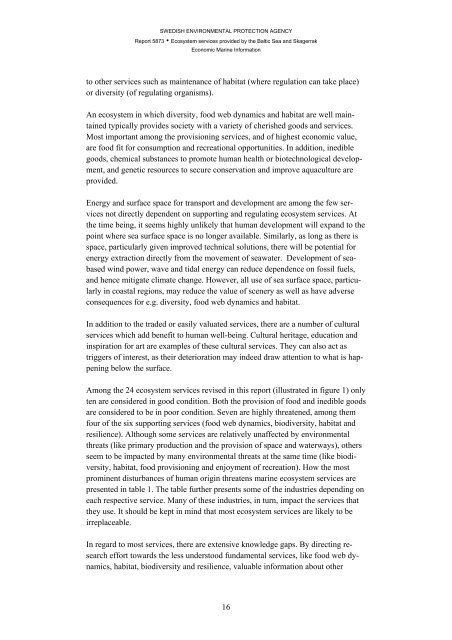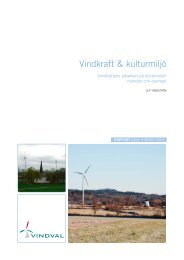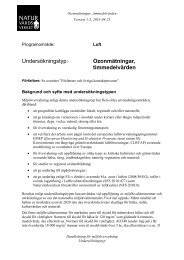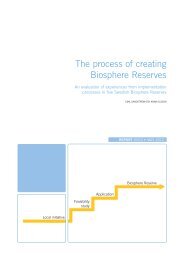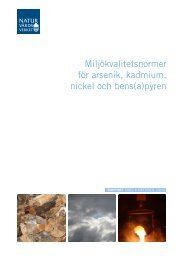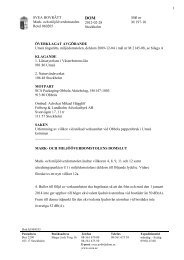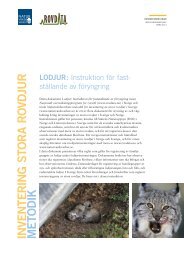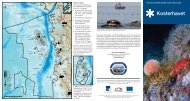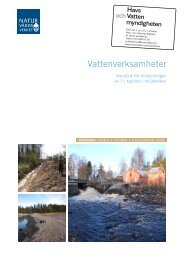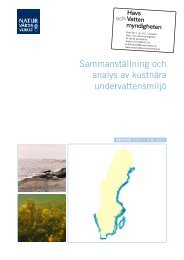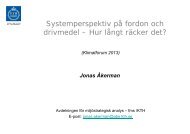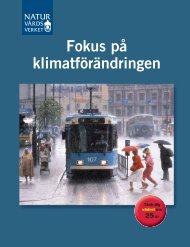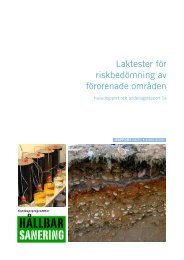Ecosystem services provided by the Baltic Sea ... - Naturvårdsverket
Ecosystem services provided by the Baltic Sea ... - Naturvårdsverket
Ecosystem services provided by the Baltic Sea ... - Naturvårdsverket
Create successful ePaper yourself
Turn your PDF publications into a flip-book with our unique Google optimized e-Paper software.
SWEDISH ENVIRONMENTAL PROTECTION AGENCY<br />
Report 5873 • <strong>Ecosystem</strong> <strong>services</strong> <strong>provided</strong> <strong>by</strong> <strong>the</strong> <strong>Baltic</strong> <strong>Sea</strong> and Skagerrak<br />
Economic Marine Information<br />
to o<strong>the</strong>r <strong>services</strong> such as maintenance of habitat (where regulation can take place)<br />
or diversity (of regulating organisms).<br />
An ecosystem in which diversity, food web dynamics and habitat are well maintained<br />
typically provides society with a variety of cherished goods and <strong>services</strong>.<br />
Most important among <strong>the</strong> provisioning <strong>services</strong>, and of highest economic value,<br />
are food fit for consumption and recreational opportunities. In addition, inedible<br />
goods, chemical substances to promote human health or biotechnological development,<br />
and genetic resources to secure conservation and improve aquaculture are<br />
<strong>provided</strong>.<br />
Energy and surface space for transport and development are among <strong>the</strong> few <strong>services</strong><br />
not directly dependent on supporting and regulating ecosystem <strong>services</strong>. At<br />
<strong>the</strong> time being, it seems highly unlikely that human development will expand to <strong>the</strong><br />
point where sea surface space is no longer available. Similarly, as long as <strong>the</strong>re is<br />
space, particularly given improved technical solutions, <strong>the</strong>re will be potential for<br />
energy extraction directly from <strong>the</strong> movement of seawater. Development of seabased<br />
wind power, wave and tidal energy can reduce dependence on fossil fuels,<br />
and hence mitigate climate change. However, all use of sea surface space, particularly<br />
in coastal regions, may reduce <strong>the</strong> value of scenery as well as have adverse<br />
consequences for e.g. diversity, food web dynamics and habitat.<br />
In addition to <strong>the</strong> traded or easily valuated <strong>services</strong>, <strong>the</strong>re are a number of cultural<br />
<strong>services</strong> which add benefit to human well-being. Cultural heritage, education and<br />
inspiration for art are examples of <strong>the</strong>se cultural <strong>services</strong>. They can also act as<br />
triggers of interest, as <strong>the</strong>ir deterioration may indeed draw attention to what is happening<br />
below <strong>the</strong> surface.<br />
Among <strong>the</strong> 24 ecosystem <strong>services</strong> revised in this report (illustrated in figure 1) only<br />
ten are considered in good condition. Both <strong>the</strong> provision of food and inedible goods<br />
are considered to be in poor condition. Seven are highly threatened, among <strong>the</strong>m<br />
four of <strong>the</strong> six supporting <strong>services</strong> (food web dynamics, biodiversity, habitat and<br />
resilience). Although some <strong>services</strong> are relatively unaffected <strong>by</strong> environmental<br />
threats (like primary production and <strong>the</strong> provision of space and waterways), o<strong>the</strong>rs<br />
seem to be impacted <strong>by</strong> many environmental threats at <strong>the</strong> same time (like biodiversity,<br />
habitat, food provisioning and enjoyment of recreation). How <strong>the</strong> most<br />
prominent disturbances of human origin threatens marine ecosystem <strong>services</strong> are<br />
presented in table 1. The table fur<strong>the</strong>r presents some of <strong>the</strong> industries depending on<br />
each respective service. Many of <strong>the</strong>se industries, in turn, impact <strong>the</strong> <strong>services</strong> that<br />
<strong>the</strong>y use. It should be kept in mind that most ecosystem <strong>services</strong> are likely to be<br />
irreplaceable.<br />
In regard to most <strong>services</strong>, <strong>the</strong>re are extensive knowledge gaps. By directing research<br />
effort towards <strong>the</strong> less understood fundamental <strong>services</strong>, like food web dynamics,<br />
habitat, biodiversity and resilience, valuable information about o<strong>the</strong>r<br />
16


